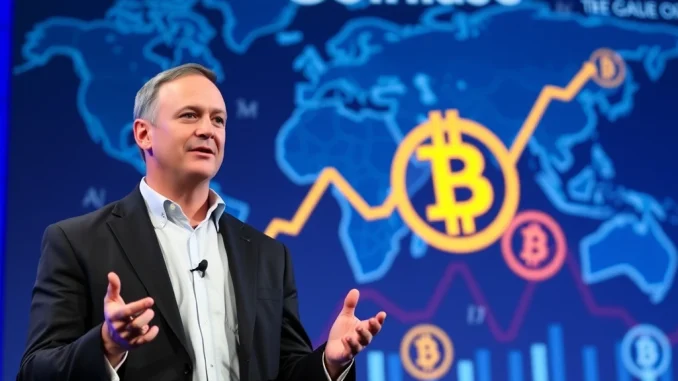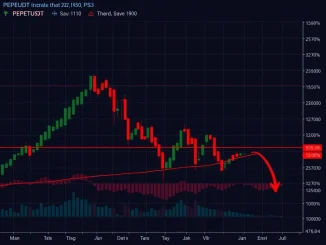
In a recent statement that quickly resonated across the digital asset community, Coinbase CEO Brian Armstrong made a compelling declaration: the world urgently needs crypto. Taking to social media, Armstrong articulated a strong case for why digital assets are not just relevant, but essential in the current global climate. This isn’t just another executive opinion; it’s a perspective from the head of one of the largest cryptocurrency exchanges, rooted in observations about macroeconomic trends impacting people worldwide. For anyone watching the intersection of global finance and technology, this assertion from the Coinbase CEO warrants close attention.
Why the World Needs Crypto Now, According to Brian Armstrong
Brian Armstrong’s argument is multifaceted, drawing on several key global economic indicators. He points to a convergence of factors that he believes make the case for cryptocurrency stronger than ever. His primary concerns revolve around:
- **Exponentially Growing Debt Levels:** Many nations face unprecedented levels of national debt. This raises questions about future economic stability, currency devaluation, and the long-term burden on citizens. Crypto, with its decentralized nature and often capped supply (like Bitcoin), offers an alternative store of value outside of traditional debt-burdened systems.
- **Inflation Affecting Many Nations:** From developed economies to emerging markets, inflation is eroding purchasing power. People’s savings are losing value, and the cost of living is rising. Armstrong suggests that cryptocurrencies can serve as a hedge against inflation, providing a potential refuge for wealth preservation in turbulent economic times.
- **Eroding Economic Freedom:** Armstrong argues that traditional financial systems and increasing government controls can limit individual economic freedom. This includes restrictions on how people can save, spend, and transfer value. Crypto, by its design, offers permissionless access to financial services, empowering individuals regardless of their location or status within traditional systems.
These points collectively paint a picture of a global financial landscape under stress, where traditional solutions appear insufficient for many. This is where the narrative for why the world needs crypto gains traction.
Addressing Global Challenges with Economic Freedom Through Crypto
Armstrong’s call to action is clear: “It’s time to increase economic freedom globally, with crypto.” But how exactly can digital assets contribute to this goal, especially in the face of significant inflation and debt?
Cryptocurrencies offer several potential benefits that align with Armstrong’s vision:
- **Alternative Store of Value:** Assets like Bitcoin are often seen as digital gold, offering a potential hedge against currency devaluation caused by inflation and excessive money printing linked to rising debt.
- **Permissionless Access:** Anyone with an internet connection can access and use cryptocurrencies, bypassing traditional banking infrastructure that may be inaccessible, expensive, or restrictive. This is crucial for the billions globally who are unbanked or underbanked.
- **Transparency and Security:** Blockchain technology provides a transparent and secure ledger for transactions, reducing reliance on intermediaries and potentially combating corruption that can exacerbate economic instability.
- **Global Mobility of Capital:** Crypto allows for the fast and inexpensive transfer of value across borders, empowering individuals and businesses to participate in the global economy more freely.
While the crypto market is known for its volatility and faces regulatory hurdles, the underlying principles of decentralization, transparency, and individual control resonate strongly in environments where trust in traditional systems is wavering due to factors like inflation and debt burdens.
What Does This Mean for the Future of Finance?
The perspective shared by the Coinbase CEO highlights a growing sentiment among proponents of digital assets: that crypto is not just a speculative investment class, but a fundamental technological shift offering solutions to real-world economic problems. As discussions around economic freedom and the impact of rising inflation and debt intensify, the role of decentralized technologies is likely to become a central theme.
For users, this reinforces the narrative of crypto as a tool for empowerment and financial sovereignty. For policymakers, it serves as a reminder of the growing demand for alternatives to traditional financial systems and the need for clear, thoughtful regulation that fosters innovation while protecting consumers.
Ultimately, the view espoused by Brian Armstrong crypto advocates is that digital assets provide a path toward a more open, inclusive, and resilient global financial future.
Conclusion: A Critical Time for Crypto’s Role
Brian Armstrong’s assertion that the world needs crypto now more than ever is a powerful statement rooted in the tangible pressures of rising global inflation and debt, and the perceived erosion of economic freedom. As the global economy navigates uncertain waters, the principles underpinning cryptocurrency offer potential solutions and alternatives that are increasingly relevant to individuals seeking greater control over their financial lives. The vision shared by the Coinbase CEO is one where digital assets play a crucial role in building a more resilient and equitable financial system for everyone.



